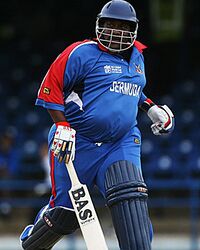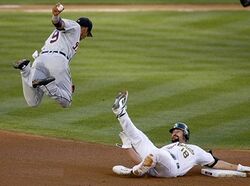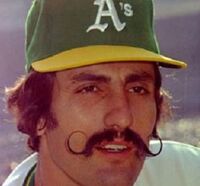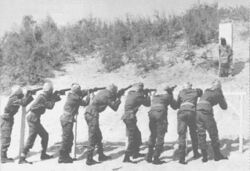Rules of baseball
| |||||||
“I didn't say, "Simon says!" You have to go back!”
~ Abner Doubleday
In the sport of baseball, a massive rulebook delivers the high level of boredom that fans and players expect. The principle underlying the Official Baseball Rules is that no one on the field should do anything until everyone is completely ready.
Fans used to say lovingly that "there are no clocks in baseball," especially fans who stopped punching theirs two decades ago, but now there are several. Having extended commercial breaks from 30 seconds to 3 minutes (6 minutes in the playoffs), Major League Baseball at the 2006 winter meetings set out to "speed up the game" with new demands on the players. The pitcher must now pitch promptly after receiving the ball, unless there are baserunners or other excuses to justify stalling. Prima donna players who bask in fan adulation for longer than the commercial break can be fined and psychoanalysed.
Contents
Fly outs
On a ball hit into the air, runners must return to their bases and wait for the ball to be caught. During this wait, one of very many in baseball, the runner can ask the opposing infielder for a loan, maybe ten or twenty bucks; you know, just enough to tide him over until payday; or for the loan of his comb, since running the bases does tend to make you look scruffy and this is hardly the image you want to present to the television audience. Once the ball is caught, the runner may be able to take the next base.
Sometimes a batter hits a fly ball far enough that a player can advance to the next base in relative safety. In this case, the batter is credited with a sacrifice. This has no religious implications — that's Major League Baseball's story and they are sticking to it, no matter how many Dominican Santeria priests wander into the clubhouse with chickens. The players like fresh eggs, and don't let anyone tell you any different.
Infield Fly Rule
The Official Baseball Rules, you see, are broken. Every single one of them was written for a sensible reason, but the aggregate is inscrutable, not unlike the U.S. tax code. For this reason, the manager visiting the pitcher's mound is often accompanied not only by a trainer and interpreter but by three law clerks.
Each rule that penalizes the defense for dropping a pitch or a batted ball creates cases where it's advantageous to do so deliberately, and requires another rule to close the loophole. The batter swings for strike three, but the catcher drops the pitch. Does he or doesn't he have to throw to first base to complete the strikeout? Better phone your son at college. When a ball is hit harmlessly in the air, the umpire points to the heavens and calls the batter out before anyone catches it. Just to keep anyone from dropping it on purpose. The umpires can rule that a dropped catch was an undropped catch. Being the only one in the ballpark who knows what happened gives you instant street cred. But it also tips off the cute girl in the next seat that to date you is to enter a world full of arcane facts that will bore her.
Base stealing
Americans naturally tend to want what they don't have — and then just take it. Thus, if you are safely at first base, you naturally wish you were further along. So, just go, already! In the American tradition of pilferage, this is called "stealing" a base and considered an act of valor. There is no consequence unless you are caught in the act and tagged with the ball (between the bags, as it were). If the defense doesn't care, you can go wherever you want, and the Official Scorer decides whether the disinterest is justified (a ruling of Indifference). Black players do the most stealing and no one is surprised.
Balk
In view of the rampant and uncontrolled stealing of bases, the worthies at Baseball asked only whether the rules were fair to the thief. A really sneaky pitcher, you see, could make base-stealing impossible, and Americans could not relate to baseball if cheating were eliminated. To defend the honest institution of stealing, they made sneakiness illegal.
So it's a balk, and the runner can take the base he was trying to steal, if the pitcher acts like he's pitching but doesn't, acts like he's pursuing the runner but doesn't, drops the ball, licks the ball, moves and then stops, stops and then moves, or does anything unusual at all. It is not for nothing that the rule book occupies three of the umpire's pockets and there is a microfiche reader beside home plate.
No one really knows what a balk is; even the umpires aren't sure and they say they've read the rule book (though some just looked at the pictures). However, like pornography, we all know it when we see it. In the NFL, the referees are miked up and deliver a sermon over the loudspeakers to explain each penalty. In baseball, an umpire simply points for all the runners to move to a different base. The commentators guess what happened, and no one else in the ballpark has a clue.
Earned runs
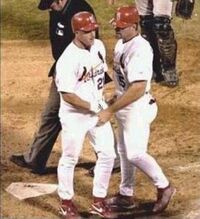
If the pitcher is pitching well but one of his teammates drops a ball or throws wild, baseball's finest minds stop contemplating how many angels can dance on the head of a pin and really spring into action. The rules require that the Official Scorer not just make a check-mark on his scorecard, but create an alternate baseball universe where the mishap did not occur. This can be done during one of the many dead spots in the action. Any scoring that ensues is not charged to the pitcher unless it also occurred in the alternate universe. It is called "unearned," just like investment income. All pitching averages come from this Fantasyland.
A pitcher is charged with losing a game if he allows a runner on base who scores the run (or, as a n00b terms it, a "point") that unties the game for good. A pitcher wins the game when — well, he is never pitching when his team takes the lead for good. A pitcher gets wins for being in about the right place at the right time. But don't worry, it all averages out over the course of a season.
Saves
The baseball closer has nothing to do with that show on TNT starring Kevin Bacon's wife. Rather, it is the substitute pitcher who relieves the starter when the team is barely in the lead and "saves" the victory. This is your best reliever; you have other scrubs to soak up innings when the team is losing, just in case your guys remember how to hit. The greatest closer of all time is Rollie Fingers, who has the most awesome baseball mustache this side of Sal Fasano.
Throwing one pitch to finalize a 15-0 win is not valorous. Getting three outs with the tying run on third base, is. As for everything in-between, baseball again separates the heroic from the mundane with an inscrutable rule. It is a rule-of-threes containing a rule-of-threes, and don't forget the part about phases of the moon.
As the rulebook defines a save, the rulebook is often permitted to manage the game: The closer pitches the ninth inning, even when the previous pitcher was doing fine, to pad the closer's number of saves. Conversely, the closer cannot pitch, even when it's a game the team needs to win, if it was "not a save situation." A manager's detractors criticize him for leaving pitchers in the game too long and for taking pitchers out of the game too soon — but they can't criticize him if he simply follows this dumb rule.
Home runs
Cricket fans need to remember that a team only scores a run when a runner circles the diamond, and he can't just decide to run another lap. A ball hit out of the playing field — a "six" — is therefore only a four, and if the bases are empty, it is only a one. A ball hit out of the playing field on a bounce — a "four" — is at most a two. Got it?
If British tried to play baseball, the visiting team would play all its innings, one after the other. Borr-ing! Then the home team would come up to bat and the only suspense would be whether they could exceed the visitors' score before the sun goes down — after taking two hours off for scones, tea, and effeminate talk.
When a superstar batter hits a ball out of the playing field, it typically arrives among fans who have paid hundreds of dollars only to be sat 400 feet from the action at home plate. The only thing that will make the day a success is ripping the ball out of the hands of the child who legitimately caught it, the punk.
TV and radio commentators come up through the minor leagues, just as players and umpires do. The only skill they develop during this decades-long apprenticeship is a distinctive, personal affectation for announcing a home run. For example, it is long, it is deep, it is GONE!!!!! (Then read from an index card a stale play on the batter's name.)
Designated Hitter
Another of baseball's dirty little secrets is that, for a pitcher to get really good, he has no time to practice batting. When it is his turn to bat, paying fans get a display of total ineptitude. Serene baseball executives would have shrugged and noted that a substitute batter can be used (though that means the pitcher is done for the day). But the pitcher has endorsed a breakfast cereal and needs all the TV face time he can get.
Baseball solved this dilemma by cobbling together a work-around rule that, in place of the pitcher who is horrible at hitting, the team can use a Designated Hitter (DH), who is usually horrible at everything else — typically a paunchy 45-year-old with bad knees and a bad attitude, but arm muscles larger than your legs. The DH Rule, designed to add punch and scoring to the game, mostly just extends the careers of washed-up players. But the Players' Association gets more union dues, and Dad doesn't have to learn new names so quickly.
The pitcher can sit in the dugout and be oblivious to his team's turn on offense. There are many things he can do in this interim, but most involve that plastic bucket full of bubble gum. But the DH really avoids heavy lifting. He has about one minute of work, maybe four times all day. At other times, he nods off, because if he stayed awake, he'd worry about being replaced by one of those new, young players who can actually catch and throw the ball.
Only the American League (and one of Japan's copycat leagues) adopted the DH Rule; the National League (and the other of Japan's copycat leagues) still requires all nine players to be well-rounded. Panic precedes inter-league games. Before traveling to an NL city, an AL team has to devise a completely new batting order for a game in which all nine players have to be good. When the NL team visits, there is only minor discomfort at whether the pitcher will react well to not being allowed to strike out four times.
Like Medicare, the DH Rule can never be repealed. Everyone can see the horrible results, but the original intentions were just so damned noble.
Instant replay
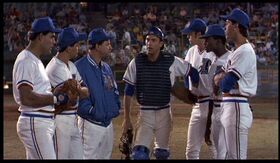
Baseball has a long history of conducting, on the field of play while fans sit and wait, arguments that should be made at the sports lounge after the game. Faced with the perception that other sports were overtaking it in technology, baseball in 2009 adopted the instant replay. Umpires do not don headphones and duck underneath a hood to watch a television screen, as in the NFL. Rather, a lawyer in New York City reviews tape of the play and stands ready to deliver an opinion if the umpires ask for it. These lawyers have no idea that the league will lose one billion dollars if their decisions let two teams with no fans make it to the World Series. None at all. Kansas City versus Milwaukee in the finals is just fine with them; if no one from either coast tunes in, that's his loss.
See also
| Featured version: 1 February 2017 | |
| This article has been featured on the main page. — You can vote for or nominate your favourite articles at Uncyclopedia:VFH. | |
| Poo Lit Surprise-Winning Article | |
This article was chosen as the Best Noob Article in the October 2009 Poo Lit Surprise writing competition.
| |

